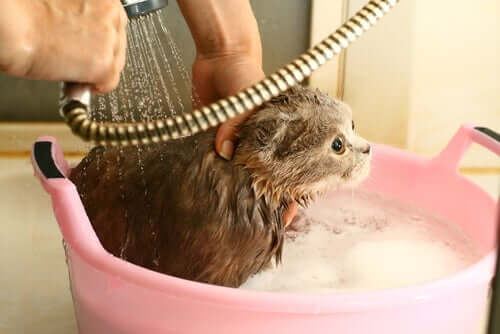How Often Should You Wash Your Cat?

Cats have a reputation for constantly, meticulously cleaning themselves. They generally do this with their tongue, which has little barbs that stick out and act like a brush. But that doesn’t mean you never have to clean your cat. Keep reading to find out exactly how often to wash your cat.
We know what you might be thinking: cats also have a reputation for hating water. But there’s a good reason for that. Their skin is very sensitive, and water temperature can easily affect it. So, our recommendation is to wash your cat in lukewarm water. This will make it much more likely for your cat to be willing to bathe.
People used to say it wasn’t a good idea to wash a cat. However, experts have shown that you’re not hurting it by doing so. But that doesn’t mean it will enjoy the experience, and it will still need time to get used to it.
Wash your cat from the time it’s a kitten

If you wash your cat from the time it starts its socialization period (2-3 months old), it will save you the trouble of starting to do it when it’s an adult, which will be much harder.
Washing your cat: some breeds are easier than others
The only breed of cat that won’t start a fight around water is the Turkish Van. This breed generally enjoys bathing. Just about every other breed, even the calm ones, will act aggressively during a bath, if they’re not used to it.
But you shouldn’t necessarily wash your cat too often. That can cause it to lose some of the natural oils that protect its skin. Those oils are a big part of it staying healthy.
Bath frequency
Specialists say it’s best not to wash your cat very frequently. The only exception is if it’s strictly necessary, like if it has come into contact with a toxic substance. In that case, the bath is an emergency and you can make an exception.
Otherwise, if your cat is healthy and its fur looks fine, it will be just fine doing its regular tongue cleaning.
Some experts say that you should wash your cat every 5-6 months. Others say that you should do it every 5 weeks. But the time between one bath and another really just depends on how your cat’s skin and fur react.
The process of washing your cat
It’s best to use gardening gloves when you’re washing your cat. This will protect you in case your cat gets aggressive while you’re trying to wash it. The gloves will also help you keep better control over the cat.
Other important tips

- Lay a rag or a non-slip mat on the floor of the tub. That way your cat can dig its claws into it, and not harm itself, or you. This will also keep it from slipping around and getting scared, which will only make washing it harder.
- Be careful not to get water in its ears. You can use earplugs to avoid that if you want. You can also use a jug or a hose, which will give you more control over the water.
- Once you start washing it, you should stay calm. Your cat is aware of your emotions, and if you’re stressed, it might get stressed too.
- It’s best to trim your cat’s claws before you start with the bath. This will make it less likely that it will harm you, or itself.
- You should also be very delicate when you’re putting your cat in the bath. The best way to pick it up is to put one hand on its neck and the other under its body. Make sure to keep it away from you as you do this, so that it doesn’t scratch you. Let it down very slowly, and gently, onto the floor of the bath or tub.
- Let the cat get used to the space before you start washing it. That will help make it less skittish, and calmer.
- You should use a special shampoo for your cat’s fur. It’s not good to use dog or human shampoo–its fur needs different shampoo. If soap is necessary, use a very neutral one. But watch out, soap can cause some negative side effects like irritation, hair loss, and itching.
- You should also give your cat some kind of treat after the bath. That way, it will have a positive association with bath time, and it’ll only get easier and easier. The tastier and healthier the treat, the better!
All cited sources were thoroughly reviewed by our team to ensure their quality, reliability, currency, and validity. The bibliography of this article was considered reliable and of academic or scientific accuracy.
- de Pedro, J. (2006) Higiene de perros y gatos. Farmacia profesional, 20(10), 68-71.
